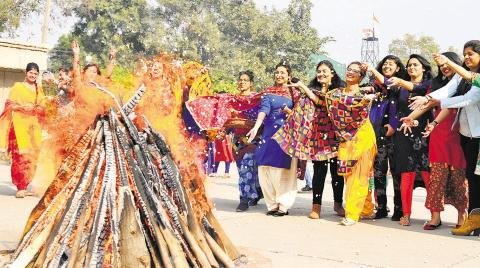Wishing You All Happy "Maagh Bihu"
North-East Citizens Are Celebrating From Today Bhugali Bihu (Maagh Bihu)

‘Sundar Mundariye…’ and ‘De ni maayi Lohri…’ at one time was like an anthem for kids, announcing the festival of Lohri coupled with the culmination of the cold winter days.In return to the songs, the kids would get rewarded with groundnuts, ‘gachak’, ‘rewari’, and even money, making the hard work of going from door-to-door worth it. Bygone are the days when students used to ask for ‘Lohri’ from their teachers and principals.With time, the festival and the mode of celebration have changed. The status of the festival has reduced to merely an insignificant holiday on the calender.The festivalLohri is celebrated on the last day of ‘Poh’ month of the Bikrami calendar, a day before the month of ‘Maagh’ begins.Celebrated across Punjab, the festival has multiple interesting folk tales associated with it. The most famous of them all is of Dulla Bhatti. Songs praising the valour of Dhulla Bhatti are sung during the celebration of the festival.Reminiscing her childhood days, district education officer Anujit Kaur narrated how she used to go to the neighbours asking for Lohri in their village. “All the kids used to go to the neighbours together, singing songs, but now the kids don’t know about it.”City residents say, only the children living in the peripheral areas and colonies ask for Lohri now, without having any knowledge about the tales behind it.Nowadays the festival is celebrated with pomp, concerts and cultural evenings are organised. Earlier, it used to be a calmer affair as the neighbours would get together and light the fire to burn the evil, throwing sesame seeds in fire, while singing: “Ishar aaye dalidder jaaye, Dalidder di jarrh chullhe paaye (It is a prayer to god to consume the evil by fire).”Sunita of Sector 50 says, “The people in villages still celebrate the festival the same way. They make a round around the fire (dhooni) and sit for hours talking to each other, eating groundnuts, ‘rewari’, and ‘gachak’ while the ‘dholis’ come to take the shagun.”Celebrating the ‘fiery’ valourDulla Bhatti was a Muslim landlord at the time of emperor Akbar in Lahore. As the tale goes by, he is remembered for standing up against the emperor, emerging as the symbol of Punjabi culture, for saving girls from being sold as slaves. He saved two Brahmin girls Sundri and Mundri from Akbar and married them off on the day of Lohri and giving birth to the famous song ‘Sundar Mundariye ho..tera kaun vichara..Dulla Bhatti wala..’